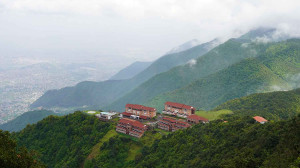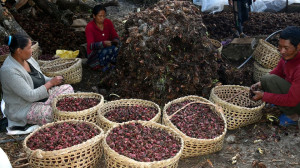Money
Chicken prices jump on slowed supply
Chicken prices in the Kathmandu Valley have jumped 24 percent over the past month largely due to a slump in supplies amid growing demand. The popular meat now costs Rs310 per kg compared to Rs250 a month ago, traders said. Prices had reached Rs290 in mid-April.
Chicken prices in the Kathmandu Valley have jumped 24 percent over the past month largely due to a slump in supplies amid growing demand. The popular meat now costs Rs310 per kg compared to Rs250 a month ago, traders said. Prices had reached Rs290 in mid-April.
“Demand began to swell in mid-April with the start of the wedding season, and it has not subsided,” said Shreeya Dhakal, vice-president of the Chicken Sellers Association.
“However, we expect prices to drop with the beginning of the monsoon.”
The April 25 earthquake and subsequent trade embargo by the southern neighbour significantly affected the poultry industry. “Chicken farmers are still struggling to recover,” said Dhakal.
According to the Nepal Hatchery Association, production shrank 50 percent during the Tarai unrest. With an improvement in the situation, output has started to increase since February. However, with the arrival of the summer season, production started to drop again.
Dhakal said that soaring temperatures in the Tarai had badly affected chicken output besides pushing up production costs.
Hot weather can have a severe impact on poultry. Production efficiency can be affected long before the temperature reaches a level at which survival becomes a concern.
The total consumption of chicken meat in the Kathmandu Valley amounts to 300-400 tonnes per day. Most of the chicken comes from poultry farms in Kavre, Dhading, Nuwakot, Lalitpur and other districts near Kathmandu. Meanwhile, egg prices have also increased this month to Rs13 per unit from Rs10 last month because of a decline in production, the Nepal Egg Producers’ Association said.
“Production dries up during the summer, and it has fallen by 15-20 percent this month,” said Shiva Ram KC, president of the association. “Hens eat less feed and produce fewer eggs when the temperature escalates.”
According to KC, the total supply of eggs throughout the country has fallen to 1.7 million units per day from 2.1 million during February.
Deliveries are expected to fall further this month amid reports of a decline in production.




 13.98°C Kathmandu
13.98°C Kathmandu














